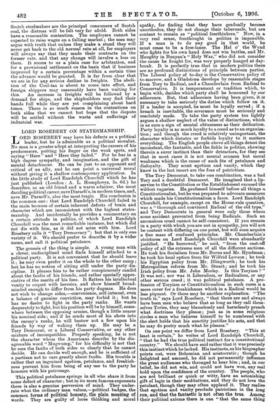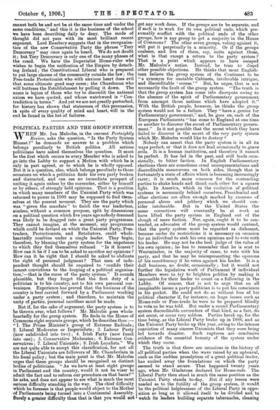LORD ROSEBERY ON STATESMANSHIP.
TORD ROSEBERY may have his defects as a political J leader, but he is admirable as a political moralist. No man is a greater adept at interpreting the careers of his predecessors, putting his finger on the weak spots, and saying " Here ' and "Here they failed." For he has in a high degree sympathy, and imagination, and the gift of mental detachment. He can be just to an opponent and critical of an ally, and be can point a universal moral without giving it a shallow contemporary application. In the little study of Lord Randolph Churchill which he has just published (London : A. L. Humphreys, 3s. 6d.) he describes, as an old friend and a warm admirer, the most dazzling political career, save Disrael s, in modern times, and, save Mr. Parnell's, also the most tragic. His conclusion is the common one : that Lord Randolph Churchill failed in the main because of certain inherent defects of brain and character which are inconsistent with the highest states- manship. And incidentally he provides a commentary on a certain attitude in politics, of which Lord Randolph Churchill was the most remarkable instance, but which did not die with him, as it did not arise with him. Lord Rosebery calls it "Tory Democracy" but that is only one variety of it. We should prefer to describe it by a wider name, and call it political petulance.
The genesis of the thing is simple. A young man with a clever, undisciplined mind finds himself attached to a political party. It is not convenient that he should leave it ; he may even prefer it on the whole to the other camp ; but he has no notion of sitting still under the party dis- cipline. It pleases him to be rather conspicuously candid about the faults of his friends, and rather specially appre- ciative of the merits of his foes. It flatters his intellectual vanity to coquet with heresies, and. show himself broad- minded enough to differ from his party dogmas. He does not wish to change sides,—convenience, self-interest, even a balance of genuine conviction, may forbid it ; but he has no desire to fight in the party ranks. He wants desperately to fight, but his position will be by himself, some- where between the opposing .armies, though a little nearer his nominal side ; and if he sends most of his shots into the enemy's ranks, he will bestow not a few upon his friends by way of waking them up. He may be a Tory Democrat, or a Liberal Conservative, or any other mixture of incompatibles. Properly speaking, he is not the character whom the Americans describe by the dis- agreeable word "Mugwump," for his difficulty is not that he sees the faults of both sides so clearly that he cannot decide. He can decide well enough, and he is sufficient of a partisan not to care greatly about faults. His trouble is rather that an ingrained egotism, petulance, and freakish- ness prevent him from being of any use to the party he honours with his patronage.
This political petulance springs in all who share it from some defect of character ; but in its more famous exponents there is also a genuine perversion of mind. They under- rate what the ordinary man values,—political badges, the common forms of political honesty, the plain meaning of words. They are guilty of loose thinking and moral apathy, for finding that they have gradually become unorthodox, they do not change their tabernacle, but are content to remain as "political freethinkers." Now, in a very real sense, freethought in politics is impossible. If a man is to do any good in that world, he must cease to be a free-lance. The Hal o' the Wynd who fights for his own hand does not win battles, and Mr. Haughty in Bunyan's "Holy War," who did not consider the cause he fought for, was very properly hanged at day- break. It is perfectly true that in modern politics there are no profound distinctions of principle between parties. The Liberal policy of to-day is the Conservative policy of to-morrow, and a Gladstone develops by reasonable stages from Tory to Radical, and a Chamberlain from Radical to Conservative. It is temperament or tradition which, to begin with, decides which party shall be honoured by our adherence. But, that adherence having been given, it is necessary to take seriously the duties which follow on it. If a leader is accepted, he must be loyally served ; if a breach is inevitable, the severance must be seriously and resolutely made. To take the party system too lightly argues a shallow neglect of the value of distinctions, which is as sure a sign of mental obtuseness as their deification. Party loyalty is as much loyalty to a creed as to an organisa- tion; and though the creed is relatively unimportant, the character which dictates or forbids loyalty to it matters everything. The English people above all things detest the inconstant, the fantastic, and the fickle in politics, showing therein a surer instinct than their detractors, for they see that in most cases it is not mental acumen but moral weakness which is the cause of such fits of petulance and disloyalty. They scent egotism and vanity, which they know in the last resort are the foes of patriotism.
The Tory Democrat, to take one combination, was a, bad Tory and a doubtful Democrat. He imagined that a lip- service to the Constitution or the Establishment excused the wildest vagaries. He,professed himself before all things a Constitutionalist, but he was prepared to advocate measures which made his Constitutionalism a farce. Lord Randolph Churchill, for example, except on the Home-rule question, was a "thorough and convinced Radical of the old type," and Tory Democrats in general were only those whom some accident prevented from being Radicals. Such an anomalous creed cannot be self-consistent. If you remain in a party with which you are not in sympathy, you will not be content with differing on one point, but will soon acquire a, fine mass of confused principles. Mr. Chamberlain's strictures on Lord Randolph Churchill were abundantly justified. "He borrowed," he said, "from the cast-off policy of all the extreme men of all the different sections. He took his Socialism from Mr. Burns and Mr. Hyndman ; he took his local option from Sir Wilfrid Lawson ; he took his Egyptian policy from Mr. Illingworth ; he took his Metropolitan reform from Mr. Stuart; and he took his Irish policy from Mr. John Morley. Is this Toryism ? " It was not ; nor was it Liberalism, or Radicalism, or any other serious creed ; it was political petulance. A pro- fession of Toryism or Constitutionalism in such cases is a mere cover for a freakishness which in a Radical would be less piquant. Or there may be another explanation. "The truth is," says Lord Rosebery, "that there are and always have been men who believe that so long as they call them- selves Tories, they may blamelessly and harmlessly preach what doctrines they please; just as in some religious circles a man who believes himself to be numbered with the elect holds that his sanctity justifies his acts, and that he may do pretty much what he pleases."
On one point we differ from Lord Rosebery. "This at least is certain," he writes of Lord Randolph Churchill, "that he had the true political instinct for a constitutional country." We should have said rather that it was precisely this instinct which he lacked. His instincts, as his biographer points out, were Bohemian and aristocratic; though he delighted and amused, he did not permanently influence the great audiences who thronged to hear him ; and, in our belief, he did not win, and could not have won, any real hold upon the confidence of the country. The people, who are not brilliant or quick or witty, have an astonishing gift of logic in their meditations, and they do not love the petulant, though they may often applaud it. They realise that egotism and vanity preclude patriotism in the long run, and that the fantastic is not often the true. Among their political axioms there is one "that the same thing cannot both be and not be at the same time and under the same conditions," and. this it is the business of the school we have been describing daily to deny. The mode of thought did not pass with its most brilliant recent exponent. Lord Rosebery suggests that in the reorganisa- tion of the new Conservative Party the phrase "Tory Democracy" may once again be heard. We do not doubt it; but Tory Democracy is only one of the many phases of the creed. We have the Imperialist Home-ruler who wishes to begin the unification of the Empire by detach- ing Ireland ; the Constitutional Liberal who is prepared. to put large classes of the community outside the law ; the Free-trade Protectionist who with anxious heart does evil that some ultimate good may come ; the Churchman who will buttress the Establishment by pulling it down. The name is legion of those who try to discredit the national axiom we have quoted, and whose watchword is "Con- tradiction in terms." And yet we are not greatly perturbed, for history has shown that statesmen of this persuasion, in spite of every quality of mind and heart, will in the end be found in the list of failures.































































 Previous page
Previous page